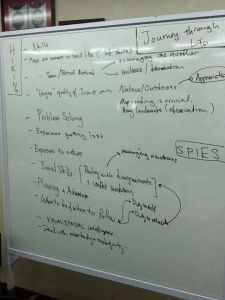During Unit Leader Woodbadge Course (ULTWBC) Intake II – 2011, leaders shared their personal views and reflections on the purpose of a Scout hike as part of the programme for Scouts across all ages and sections. This sharing is captured in the photo and the summarised points below.
Each of these educational purposes may be associated with a particular learning experience embedded in the Scout Hike. In order to understand these further, the pertinent learning experiences have been described in the table below, and an attempt has been made to draw linkages between these experiences and the various Scouting frameworks as well as MOE Singapore’s Social Emotional Learning Framework, which is also connected to the 21st Century Competencies.
| Learning Experience | SPIES Area | Scouting Principles/ Method | Connection to SEL Framework |
| Picking up the basic navigational skills and sharing preparation work for the hike, in consultation with adults.
For first time hikers, this may cause anxiety in anticipation of the unknown.
It also requires physical preparations such as getting sufficient rest and hydrating well.
|
Physical
Intellectual Emotional |
Be Prepared (Motto)
Adult Support (M) Patrol System (M)
Duty to Self (P) Duty to Others (P) |
Identifying and recognising emotions (Self Awareness)
Goal setting and organisational skills (Self Management)
Recognising strengths, needs and values (Self Awareness) |
| Planning routes from checkpoint to checkpoint using a map and compass.
|
Intellectual | Patrol System (M) | Self efficacy (Self Awareness) |
| Coming to an agreement on which route to actually take between checkpoints.
This requires analysing which route is more suitable using navigational concepts, it also requires social skills of managing disagreement, conflict and emotions in a team.
Scouts will need to learn when to lead, and when to follow.
|
Intellectual
Social |
Patrol System (M)
Duty to Self (P) Duty to Others(P) |
Empathy, Appreciating Diversity (Social Awareness)
Perspective Taking, Working Cooperatively, Negotiation, refusal and conflict management (Relationship Management)
Problem identification and situation analysis, Problem Solving, Personal, Moral and Ethical Responsibility (Responsible Decision Making)
|
| Setting out on the journey between checkpoints.
This may be physically and emotionally draining, as it takes physical fitness, mental determination and resilience to journey.
|
Physical
Emotional |
Duty to Self (P)
Duty to Others (P) |
Impulse Control and Stress Management, Self Motivation and Discipline (Self Management) |
| Journeying as a team through unfamiliar territory requires managing the emotions of being in an unfamiliar environment, and the uncertainty of whether the route taken will lead to the intended destination.
It also bonds the team through stronger/elder members helping the weaker/younger members by encouraging them, and journeying together.
|
Emotional
Social |
Duty to Self (P)
Duty to Others (P) |
Identifying and recognising emotions (Self Awareness)
Impulse Control and Self Management (Self Management)
Communication, social engagement, and building, Seeking and Providing Help (Relationship Management)
|
| Journeying through rural terrain and the great outdoors.
The difficult terrain requires physical ruggedness to manage, as well as decision making on the ground to determine the shortest/most expedient route.
|
Physical
Intellectual |
Nature (M)
|
Self Motivation and Discipline (Self Management) |
| Getting disoriented between checkpoints will produce strong emotions of uncertainty, anxiety and possibly anger.
At the same time, the team will need to re-orientate itself to the ground.
|
Intellectual
Emotional Social |
Duty to Others (P) | Identifying and recognising emotions (Self Awareness)
Respect for Others (Social Awareness)
Working Cooperatively, Negotiation, Refusal and Conflict Management (Relationship Management) |
| Experiencing physical tiredness and difficulties may produce emotions of wanting to give up, fear and lack of confidence. | Physical
Emotional Social |
Duty to Self (P)
Duty to Others (P) |
Identifying and recognising emotions (Self Awareness)
Self Motivation and Discipline (Self Management) |
Reflection
Scout Leaders and Adults who are keenly attuned to the possible educational opportunities in each part of an activity, are more likely to be able to pick up on learning moments and intentionally bring about the learning outcomes and achieve the educational purpose of an activity. While it may not be possible, nor necessary to arrive at a perfect breakdown of each and every Scout activity in the above fashion, I feel that it is useful as an exercise to agree upon the possible outcomes and purpose of each activity in each of the spheres (SPIES), so that the richness of each activity can be fully tapped. Through regular sharings and discussions, Scout leaders will become more aware and be able to make more conscious efforts to deliver the outcomes associated with each activity, instead of only focusing on the hard skill outcomes, which can often be the most tangible, but are not always the most valuable.
References: –
- Press Release – MOE to Enhance Learning of 21st Century Competencies and Strengthen Art, Music and Physical Education (2010) http://www.moe.gov.sg/media/press/2010/03/moe-to-enhance-learning-of-21s.php
- Social and Emotional Learning Framework, MOE (2010) http://www.moe.gov.sg/education/programmes/social-emotional-learning/
